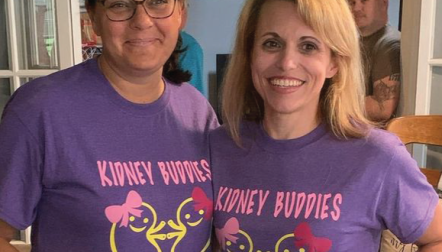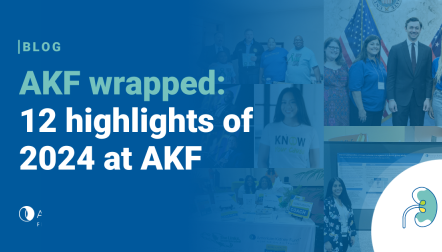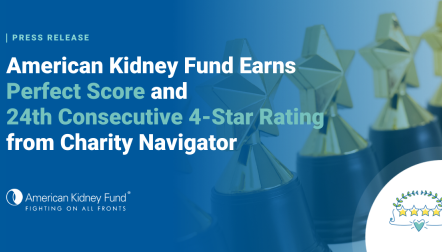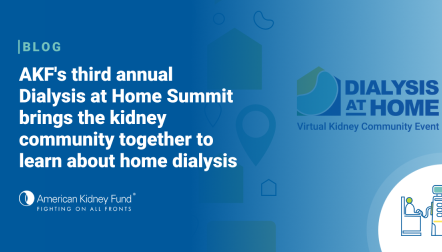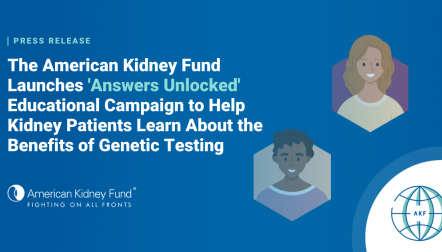
Press release
American Kidney Fund Supports Emerging Researchers Through Two New Clinical Scientist in Nephrology Fellowship Awards
Researchers from University of Washington and Children's Hospital Los Angeles begin investigation into how the eye is a window into the kidney; effects of gut microbiome on kidney and bone disease
ROCKVILLE, Md. (July 19, 2021) — The American Kidney Fund (AKF) today announced the newest recipients of research funding from its Clinical Scientist in Nephrology Program, which has been funding the most promising emerging clinical researchers in nephrology for over 30 years. Christine Limonte, MD, a nephrology clinical research fellow at the University of Washington, and Elizabeth Kermgard, MD, a pediatric nephrology fellow at Children's Hospital Los Angeles (CHLA), have been awarded two-year AKF research fellowships which began July 1.
Dr. Limonte and Dr. Kermgard join a distinguished roster of more than 40 top nephrology researchers who received early-career support from AKF through the Clinical Scientist in Nephrology Program. AKF's program strives to improve the quality of care provided to kidney patients. Since 1989, AKF has funded researchers whose work is designed to improve diagnosis, treatment and outcomes for patients living with chronic kidney disease (CKD) and kidney failure. The fellowships announced today are funded by generous grants from Akebia Therapeutics, Kissinger Family Foundation, John and Maria Laffin Trust and an anonymous donation from a family foundation.
"We are proud to award our newest AKF Clinical Scientist in Nephrology fellowships to two impressive women who are paving the way to advance clinical research and have a lasting impact on people with kidney disease," said LaVarne A. Burton, AKF President and CEO. "We are grateful for the support of our funders for their generosity in helping to fund this important research program, which has made invaluable contributions to our understanding of kidney disease and improvements in patient care for more than 30 years."
Dr. Limonte's research is utilizing novel analytics techniques to determine if blood vessel disease in the back of the eye, or retinopathy, can reveal information about kidney function and kidney disease. The goal of the investigation is to better diagnose and treat diabetic kidney disease. In a two-part study, Dr. Limonte will first use machine learning on medical record data from 10,000 patients to look at associations between kidney function and eye disease. In the second part, she will work with the Kidney Precision Medicine Project to analyze kidney biopsy samples from 75 people, using genetic data to help decipher mechanisms of kidney disease.
"Diabetes is one of the leading causes of kidney failure in the U.S., and it disproportionately impacts people from lower socioeconomic backgrounds. I want to get a better understanding of the biology of diabetic kidney disease, so that we can deliver better care to a group that desperately needs it," said Dr. Limonte. "My research will begin the discovery process to determine the molecular pathways that link retinopathy and diabetic kidney disease. This will hopefully help with diagnosis, and ultimately, lead to the discovery of treatments that might work better in some patients."
Dr. Kermgard is studying the relationship between gut microbiome and CKD, and how the interactions of bacteria in our body may impact normal bone growth and turnover — the process of resorption followed by replacement of new bone with little change in shape that occurs throughout a person's life. Her research will enroll 48 pediatric dialysis patients between the ages of six and 21, who have not been on immunosuppressive drugs or growth hormones in the last four weeks and have normal bone turnover. Her team will collect blood and stool samples and utilize shotgun sequencing to look at the microbiome, conduct analysis of short-chain fatty acids and capture the levels of parathyroid hormone (PTH) fragments, an important indicator of mineral and bone disease in CKD patients.
"When you work in pediatric nephrology, you see children who are suffering from bone disease every day," said Dr. Kermgard. "When these young patients with bone deformities are in front of you and you know that mineral and bone disease can lead to increased cardiovascular risk, it's hard not to intervene. I hope my research one day leads to the finding of an intervention that can change the microbiome or SCFA production and improve bone growth in these pediatric patients."
Dr. Limonte graduated magna cum laude from Brown University and received her medical degree from University of Pennsylvania. She completed her internal medicine residency at Northwestern University. Now, as a Nephrology Clinical Research Fellow at the University of Washington, she is working with the Kidney Precision Medicine Project, a national, NIH-sponsored consortium established to develop a better understanding of the molecular pathways involved in kidney disease. The fellowship will support her work in bringing together biology with patient-centered care.
Dr. Kermgard completed her Bachelor of Science degree in Molecular, Cell and Developmental Biology at the University of California, Los Angeles (UCLA) and received her Doctor of Medicine degree from Saint Louis University. After medical school, she completed her pediatric internship and residency at CHLA, where she is currently completing her first year of fellowship in pediatric nephrology. In parallel with her research, Dr. Kermgard will pursue a Master of Science in Clinical, Biomedical and Translational Investigations degree at the University of Southern California (USC).
About the American Kidney Fund
The American Kidney Fund (AKF) fights kidney disease on all fronts as the nonprofit with the greatest direct impact on people with kidney disease. AKF works on behalf of 1 in 7 Americans living with kidney disease, and the millions more at risk, with an unmatched scope of programs that support people wherever they are in their fight against kidney disease—from prevention through transplant. AKF fights for kidney health for all through programs that address early detection, disease management, financial assistance, clinical research, innovation and advocacy. AKF is one of the nation’s top-rated nonprofits, investing 97 cents of every donated dollar in programs, and holds the highest 4-Star rating from Charity Navigator for 21 consecutive years and the Platinum Seal of Transparency from Candid, formerly known as GuideStar.
For more information, please visit KidneyFund.org, or connect with us on Facebook, Twitter, Instagram and LinkedIn.

